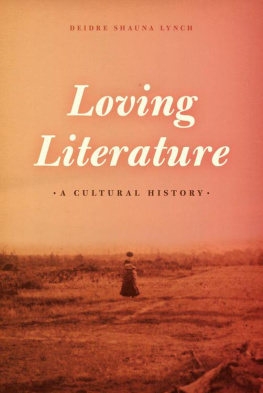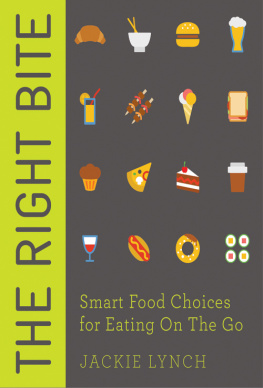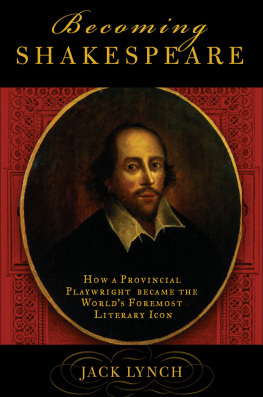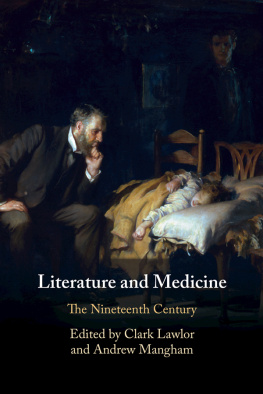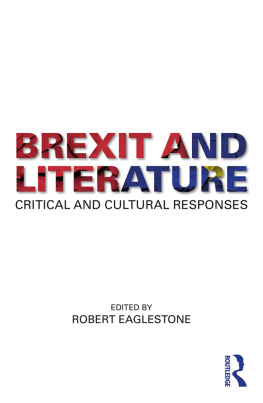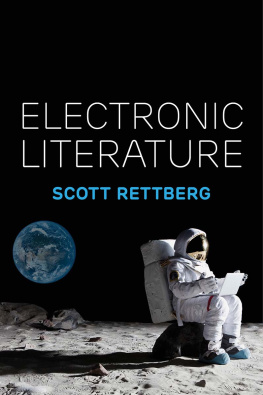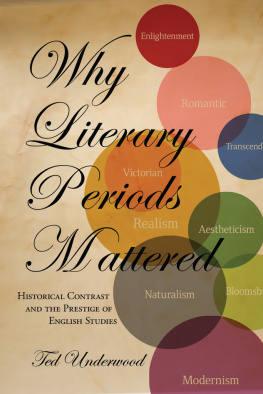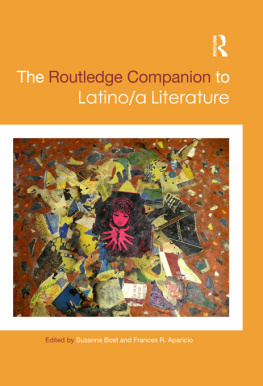Loving Literature
Loving Literature
A Cultural History
Deidre Shauna Lynch
The University of Chicago Press
CHICAGO AND LONDON
DEIDRE SHAUNA LYNCH is the Chancellor Jackman Professor of English at the University of Toronto.
The University of Chicago Press, Chicago 60637
The University of Chicago Press, Ltd., London
2015 by The University of Chicago
All rights reserved. Published 2015.
Printed in the United States of America
24 23 22 21 20 19 18 17 16 15 1 2 3 4 5
ISBN -13: 978-0-226-18370-1 (cloth)
ISBN -13: 978-0-226-18384-8 (e-book)
DOI : 10.7208/chicago/9780226183848.001.0001
The University of Chicago Press gratefully acknowledges the generous support of the Chancellor Jackman Professorship at the University of Toronto toward the publication of this book.
Library of Congress Cataloging-in-Publication Data
Lynch, Deidre, author.
Loving literature : a cultural history / Deidre Shauna Lynch.
pages cm
Includes bibliographical references and index.
ISBN 978-0-226-18370-1 (cloth : alk. paper) ISBN 978-0-226-18384-8 (e-book) 1. English literatureAppreciation. 2. English literatureHistory and criticism. I. Title.
PR1 29. U 5 L 96 2015
820.9dc23
2014015454
This paper meets the requirements of ANSI/NISO Z 39.481992 (Permanence of Paper).
Contents
AT HOME IN ENGLISH
In Loving Literature I aim to help English studies contribute to the project that Daston calls for. More precisely, I aim to suggest why self-reflection on our ways of knowing will not suffice when we seek to assess English professors characteristic mode of practicing humanist study: I aim to honor, instead, the central role that affective laborour ways of feeling, then, as well as knowinghas been assigned within English studies, and I aim to consider how through our cooperation with that assignment we have come to inhabit a profession that is paradoxically beholden to statements of personal connection. Loving Literature turns to literary studies eighteenth- and nineteenth-century prehistoryto early definitions of literariness, to histories of criticism, canonicity, literary history, and heritage, and, above all, to the emergence during this period of new etiquettes of literary appreciationso as to examine how it has come to be that those of us for whom English is a line of work are also called upon to love literature and to ensure that others do so too.
Following Max Weber, William Clark states that the modern bureaucratic distinction allowing the formation of a public-professional, expert self, and its insulation from the interests and hobbies of the amateur, private self, lies in the distinction between office and home.
Taking a long view, auto-ethnographers of our discipline have often delineated the history of English studies over the last century and a half as the story of how each new call for the professionalization that might better secure the English professors claim to expertise has been followed, in another swing of the pendulum, by a new round of amateur envy. Carol Atherton engages along these lines the equivocal procedures of the late nineteenth-century campaigners who established English literature as an academic specialty within the English universities. Even as those campaigners insisted that, distinguished as their subject was by disinterested, rationalized methods of inquiry, it was as susceptible of serious, methodical, and profitable treatment as history itself, they could not, Atherton notes, relinquish their investments in this subjects moral benefits. Aspiring to have things two ways, they presented English both as a knowledge practice and as an instrument of pastoral care and character building. Given this dualistic setup, it is understandable that our pursuits of rigor or campaigns for a new professionalism have often been shadowed by expressions of nostalgia for a past ostensibly readier to acknowledge that the project of really understanding literature necessarily eludes the grasp of expert culturesreadier to acknowledge that literature involves readers hearts as well as minds, and their sensibility as well as training.
Two fictions that influenced the late twentieth-century publics perceptions of schooling in English exemplify this tendency to identify literary
Still, an equally plausible way to describe the boundary confusion that shapes the practice of literary study would be to invert the dynamic that Mr. Keatings extramural English class and his embrace of his outsider status illustrate. We might say, instead, that the English professors affective life is supposed to slop over onto her job; its all in a days work when it does. I dont believe that the equation between professionalization and the suppression of feeling that A. S. Byatt and Peter Weir intimate suffices as a description of how we experience our working lives. My experience does not suggest to me that the personal is repressed when departments of English go about their ostensibly clinical official business. For our classeseven the graduate seminarsregularly come to be invested, as Lauren Berlant has noted, with anxieties and needs for mirroring one normally associates with the institutions of privacy and domestic intimacy, and those intimacy
How did literary pedagogy and criticism end up located in so eccentric a relationship to post-Enlightenment cultures conventional and gendered schema for segregating personal life from the public sphere, feeling from knowing, and recreation from labor? Approaching that question from diverse angles, the chapters composing this book engage with a variety of the cultural forms in which English literature was transmitted during the eighteenth and nineteenth centuries, in which literatures distinctiveness from other kinds of discourse was demarcated, and which people used to ponder their relationship with it: treatises on taste, belletristic appreciations, lives and editions of the poets, early literary histories, projects of bibliography and bibliophilia, commonplace books, albums of friendship, accounts of keep-fit regimens of rereading, and travelogues mapping authors homes and haunts, among other things. These chapters span a period in British cultural history that extends from the mid-eighteenth to the mid-nineteenth century. The records of reading that center my the former development was engendered in part by new government policies that required candidates for the civil service to be evaluated and ranked through a system of formal examinations, including those testing their knowledge of literary history. Collectively these chapters aim to outline how since its late eighteenth-century/early nineteenth-century reinvention, also the inaugural moment of its disciplinization, English literature has always been something more than an object of study, even for the architects of that disciplinization. It has also been implicated in its audiences libidinal dramas and in their understandings of their families and their erotic historieshence English studies eccentric relation to the norms of publicness and impersonality that seem to govern other knowledge-producing occupations. To ponder this implication, Loving Literature navigates among poetics, the history of aesthetics, and book history, on the one hand, and the histories of psychology, sexuality, and the family, on the other. It surveys the redefinitions of literary experienceand of the interior spaces of the mind and homethat had to occur in order for the love of literature to become part of English studies normal science.
The account a single book can provide of how that state of affairs came to be will necessarily be circumscribed. This history of the literary affections cannot directly address, though I hope it illuminates, the later nineteenth-century developments and debates that helped lay the ground for the love troubles still vexing English in the university setting. There are, for example, the materials set out in Ian Hunters
Next page
